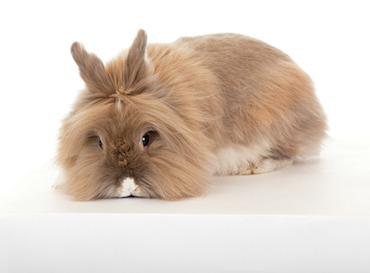Did you know that a Lionhead rabbit is the nerd of rabbits? Joking aside, these little fluffy furballs are so intelligent, they can actually learn some commands. You can teach them all sorts of new things, which will make playtime more intriguing.
But is a Lionhead the best choice for your family? How can you properly take care of your Lionhead dwarf? Will your personalities clash and collide, or will you find a playful companion?
Read along to find out.
Quick Facts & History
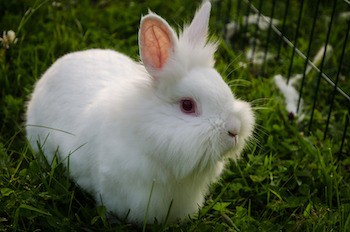
Here are a quick history and some trivia about the Lionhead rabbits.
- They were bred in Belgium.
- It is still unknown what two dwarf breeds were the genitors of the Lionhead rabbits. The most probable theory features the Swiss Fox and Netherland Dwarf rabbit as the Lionhead’s parents.
- Their unique mane is the result of a gene mutation during the breeding process. The breeder wanted to create another breed of dwarf rabbits with a long coat.
- The British Rabbit Council in the UK recognised the Lionhead breed in 2002.
- The American Rabbit Breeders Association recognised the Lionhead breed in 2013.
Lionhead Rabbit Description
- Compact bodies
- Round shape
- Single or double mane, 2-inch long
- 2-3 inches ears
- Size & weight: small; max weight: 3.5 pounds
- Soft, matt-free coat
- A variety of colours
- No markings
Lionhead Rabbits are petite and easily recognizable through their woolly mane, hence the name. Lionhead rabbits are not the kings of the jungle, but the kings of smarts, cuteness, and perkiness.
The Lionhead rabbits’ coats are what make them so cuddly and lovable. However, they need a lot of maintenance. You have to carefully comb them with a soft brush at least once per week, and even more often during shedding season.
Even so, their manes are their pride and joy. Lionhead rabbits sport two different mane styles:
- Single mane: wispy and thin; it covers their heads but can run down to their chests and rums.
- Double mane: thicker than the single mane; it can look like a skirt around their flanks.
There are several colors for the Lionhead rabbits so you can take your pick from:
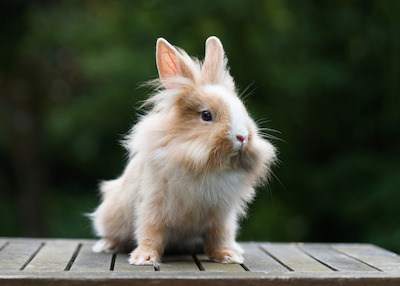
- Black
- Blue
- Bluepoint
- Blue-eyed white
- Chestnut agouti
- Chocolate
- Pointed white
- Ruby-eyed white
- Sable point
- Seal
- Siamese sable
- Silver marten
- Smoke pearl
- Tortoise
Care/Health
Below are the most important issues on how to take care of your Lionhead rabbit. Optimal care leads to top health, so you need to arrange suitable environments for these little cuties, feed them properly, and surround them with all your love.
Food
The daily healthy diet of a Lionhead rabbit is:
- 0.5 cups of pellets
- An all-you-can-eat buffet of fresh hay
- Plenty of fresh water
You can also give your Lionhead some occasional treats that consist of veggies and fruits, but don’t make a habit out of it. Two to three times per week covers their necessary requirements of vitamins and minerals from vegetables and fruits.
Grooming
There are two basic grooming duties you’ll have to undertake with your pet rabbit, whether you settle on a Lionhead or another breed:
- Brushing
- Nail trimming
Pro tip: Don’t give your rabbit baths.
We’ve all seen those cute YouTube videos with bunnies having fun at bath time, but rabbits, no matter how babyish they look, don’t need baths.
If your rabbit’s fur gets stained and you can’t remove the stain through a combing or with a wet napkin, add just 1 or 2 inches of water in a bowl for the “bath.” Wash your rabbit quickly, but with delicate movements, and then keep it warm while you dry it.
Brushing
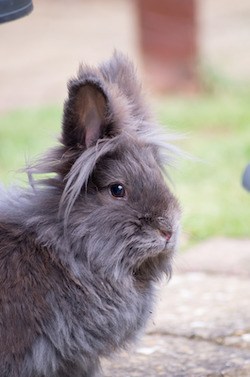
Lionhead rabbits have long coats and woolly manes. Their fluffiness is both cute and high maintenance, so some specialists recommend brushing these bunnies twice per week, though others consider that one time is enough, outside the shedding season. When they molt, everyone agrees they should be combed daily.
Why is brushing your little one important?
Lionhead rabbits have long coats and, unless you groom them regularly, they might develop mats that lead to skin infections and cause your pet a lot of pain.
While you’re at it, check for fleas or other signs of illness.
Nail trimming
Trim your rabbit’s nails once per fortnight or per month, following your vet’s advice. It’s also best to have your vet do the first nail trim so you can understand how it’s done. Rabbits get spooked easily when they hear the sound of a nail clipper, so you need some skills for the job.
Playtime
Lionhead rabbits, like all pets, need social connection and play. They need to play with you, with other rabbits, as well as alone.
That’s why you need to create a welcoming environment in the cage, with plenty of entertainment and places to hide.
Choose a large wire cage with a plastic bottom, and add grade-A bedding on top of it. Spot-clean this bedding daily and change it weekly to avoid health issues.
Spend time with your rabbit as much as possible, but let it come to you for hugs. Lionheads are easily taught all sorts of tricks, and they’re an intelligent companion.
You can also get your bunny a rabbit companion for extra entertainment. It’s better to choose a mate of the same sex, but you can also spay/neuter a pair of male-female rabbits.
Pro tip: It’s best not to allow your dog, cat, or anaconda around your Lionhead rabbit. Lionheads are tiny, so they don’t appreciate rough-housing. They’re also easily scared by quick movements, and long-term stress can weaken their immune systems.
General Health Issues
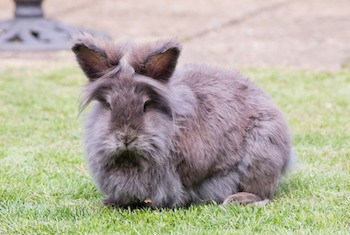
Lionhead rabbits are more prone to certain health conditions because of their small size and rabbity nature. These conditions include:
Overgrown teeth. Did you know that rabbits’ teeth are constantly growing? In the wild, a rabbit gets its teeth trimmed naturally by eating lots of hay, so that’s the main type of food you should give him. Rabbits should eat 70% hay and 30% quality pellets. To avoid dental problems in your rabbit, check its mouth regularly.
Malocclusion. Lionheads are dwarfs, which means they can also develop malocclusion, a dental issue that occurs when their upper and lower teeth are misaligned, so they can’t close their mouths properly. You can identify malocclusion if your rabbit avoids eating and constantly drops food from its mouth.
Ear mites. Lionheads are prone to getting ear mites, which is why you should keep your furball’s cage clean. Keep an eye out for prolonged scratching or fur loss, and take your rabbit to the vet’s if you suspect they have an ear infection.
Parasites. The majority of domestic rabbits are passive carriers for a parasite called E. cuniculi. This parasite is generally harmless unless your bunny is exposed to excessive stress. In this case, the parasite starts wreaking havoc. You’ll know that something is wrong if your bunny starts tilting its head awkwardly, can’t move at least one limb, pees too often, or shows signs of disturbed vision. The best course of action is to take your pet to the vet if any of these signs appear.
Reproductive cancer. Unfortunately, the majority of dwarf rabbits are prone to reproductive cancer, and Lionhead does is more at risk than bucks. It’s better to spay and/or neuter your rabbit from a young age to avoid this problem, meaning when they’re 3.5-4 months old.
Temperament & Personality
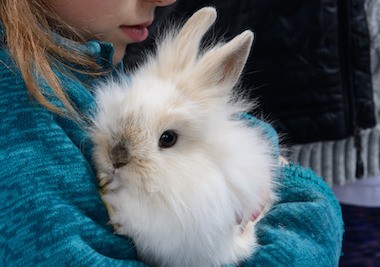
Lionhead rabbits are lively, lovable, and playful, so they make good companions and delightful pets. Some other rabbit breeds are more skittish, but the Lionhead will quickly get accustomed to your hugs and kisses.
Lionhead rabbits are adventurous, so they need a big cage to accommodate their endeavors. The cage should be about 4 x 2 x 2 inches to make sure they have room enough for play.
You can let Lionheads out of their cages for some extra exercise and fun playtime. You will have lots of fun playing a game of chase with your rabbit, especially if you allow it to run after you!
Letting a Lionhead run around in a room means more fun with all sorts of toys and balls that don’t normally fit in a cage.
In fact, allowing your Lionhead dwarf some freedom is one of the basic principles of attentive rearing. Lionheads need to spend more time with their human family and don’t do so well in prolonged captivity. Make sure the room is safe, though, with no other big pets around.
Lionheads need their time alone too. When they’re done playing, they appreciate a little privacy in their cages. After a hard time playing, they will love to spend some time grooming themselves or simply taking a nap.
The best thing about Lionheads is that you can train them. Lionheads can be potty trained and they can recognize up to three commands. These bunnies are intelligent enough, so all you have to do is create positive associations.
If you want to potty-train your little Lionhead, put a specific material in the corner of the cage where he pees and poops, and then place the same type of material in several places around your home. The bunny will choose these places to pee or poop after a few tries, and so you can reward it with a small piece of rabbit-friendly veggie.
Lionheads can show you how they feel. If they’re trying to get a bite of you or if you hear them nervously sniffing, it means they’re angry. If they’re grinding their teeth or purring, they’re having a good time. However, if these sounds get too loud, they might be in pain.
Plus, Lionheads are curious. This can be a good sign because it shows you how intelligent they are. But this curiosity might also put them in danger. If you let them roam around your home, they’ll slink in all your nooks, crannies, and clefts.
Lifespan, Breeding, and Babies
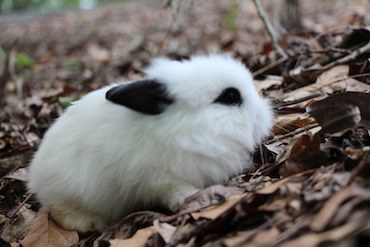
A Lionhead rabbit lives for 8 to 10 years, but yours might live even longer than that if you give him a good home, if you clean its cage regularly, feed it correctly, and surround it with your love.
If you want your rabbit to live a long, happy life:
- Don’t stress your rabbit during playtime or at any other time. Domesticated rabbits keep some of their wild instincts, and any movements that resemble those of a predator scare them. Shouts, sudden movements, and grabbing them out of the blue should all be avoided. Prolonged stress can cause your bunny digestive issues and a weakened immune system that shortens their lifespan considerably.
- Don’t take him outside with you, even if it’s in the cage. If you’re having an outdoor barbecue, the noises and hustle-and-bustle of your party will stress your rabbit. That goes double for any sorts of pets or wildlife you have in your backyard, as well as curious human visitors.
That said, you can breed your Lionhead rabbit when it’s around 9 months old if you have a male, while does are ready for some procreating action when they’re 8 months.
A Lionhead doe will gestate for 31 days. You’ll see that her time is close when she starts to nest. She will deliver anywhere between three to eight kits.
If you think that Lionhead adults are cute, wait till you see a Lionhead baby!
These little balls of fur are really tiny and fragile and come into the world with their eyes closed.
Lionhead babies open their eyes after about 10 to 14 days, and their mums wean them when they’re around one month old.
Pro tip: Separate male and female Lionhead babies after they’re weaned. These tiny rabbits have a huge instinct for reproduction and will try to mate from their infancy. However, pregnancy is dangerous for a young rabbit female, and she might also give birth to an ill kit or one with birth defects.
In Conclusion – Should I Get a Lionhead Bunny?
A Lionhead rabbit is not expensive. They can cost as little as $20, but if you choose a pedigree rabbit from a quality breeder, you can expect anywhere from $100 above.
However, the regular care costs you around $500 per year, depending on the cage, food, treats, medical care, and grooming quality you want to give it. You can triple this amount if you’re interested in a show-quality rabbit.
The pros of getting a Lionhead bunny are its long lifespan, small size, friendly nature, intelligence, plus the fact that they’re easy to train.
On the other hand, Lionheads should stay exclusively indoors, they require a lot of brushing, and they’re also prone to dental issues and fleas. Lionhead rabbits also have their quirks and can be too curious for their own good, wandering off through any crevices in your home.

